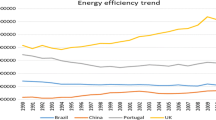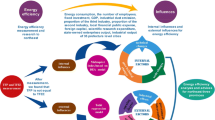Abstract
The demand for primary energy resources has increased significantly due to the rapid growth of the global economy and increasing greenhouse gas (GHG) emissions. Therefore, improving energy efficiency levels is essential for global energy, energy security, and environmental sustainability. In the context of the Asia-Pacific region, the study of energy efficiency among different countries can play a role in better energy utilization. These countries also provide a policy for the Asia-Pacific region to improve its energy utilization. This study’s primary focus is to investigate the optimal efficiency score of 15 areas of the Asia-Pacific region, and the analysis is based on super-efficiency (radical) and super slacks-based measure (SBM) data in a nonparametric DEA model. Three areas in the Asia-Pacific are selected for energy efficiency measures: South Asia, East Asia, and Australasia. The results suggest that Bangladesh, Pakistan, China, Singapore, New Zealand, the Philippines, Japan, India, Indonesia, Malaysia, Thailand, and Vietnam obtain the most efficient score of 1 in both DEA models throughout the study period. Australia and Sri Lanka receive a low score during all study periods, while Hong Kong does not have data for all study years. The results of the study will help improve energy performance, cost-effectiveness, and environmental sustainability, increasing the competitiveness and scalability of efficient energy sources.







Similar content being viewed by others
Data availability
The data that support the findings of this study are openly available on request.
References
Abdullahi S, Ismail AF, Samat S (2019) Determination of indoor doses and excess lifetime cancer risks caused by building materials containing natural radionuclides in Malaysia. Nucl Eng Technol 51 (1):325–336
Afonso A, Furceri D (2010) Government size, composition, volatility and economic growth. Eur J Polit Econ. https://doi.org/10.1016/j.ejpoleco.2010.02.002
Aghion P, Burgess RR, Redding SJ, Zilibotti F (2008) The Unequal Effects of Liberalization: Evidence from Dismantling the License Raj in India. American Economic Review 98(4):1397–1412
Ahmad M, Khattak SI, Khan A, Rahman ZU (2020a) Innovation, foreign direct investment (FDI), and the energy–pollution–growth nexus in OECD region: a simultaneous equation modeling approach. Environ Ecol Stat 27:203–232. https://doi.org/10.1007/s10651-020-00442-8
Ahmad M, Li H, Anser MK et al (2020b) Are the intensity of energy use, land agglomeration, CO2 emissions, and economic progress dynamically interlinked across development levels? Energy Environ. https://doi.org/10.1177/0958305X20949471
Al Asbahi AAMH, Gang FZ, Iqbal W et al (2019) Novel approach of principal component analysis method to assess the national energy performance via energy trilemma index. Energy Rep. https://doi.org/10.1016/j.egyr.2019.06.009
Alemzero DA, Iqbal N, Iqbal S et al (2020a) Assessing the perceived impact of exploration and production of hydrocarbons on households perspective of environmental regulation in Ghana. Environ Sci Pollut Res. https://doi.org/10.1007/s11356-020-10880-3
Alemzero DA, Sun H, Mohsin M et al (2020b) Assessing energy security in Africa based on multi-dimensional approach of principal composite analysis. Environ Sci Pollut Res. https://doi.org/10.1007/s11356-020-10554-0
Ali A, Erenstein O (2017) Assessing farmer use of climate change adaptation practices and impacts on food security and poverty in Pakistan. Clim Risk Manag. https://doi.org/10.1016/j.crm.2016.12.001
Alkire S, Foster J (2011) Counting and multidimensional poverty measurement. J Public Econ. https://doi.org/10.1016/j.jpubeco.2010.11.006
Anser MK, Alharthi M, Aziz B, Wasim S (2020a) Impact of urbanization, economic growth, and population size on residential carbon emissions in the SAARC countries. Clean Techn Environ Policy. https://doi.org/10.1007/s10098-020-01833-y
Anser MK, Hanif I, Alharthi M, Chaudhry IS (2020b) Impact of fossil fuels, renewable energy consumption and industrial growth on carbon emissions in Latin American and Caribbean economies. Atmosfera. https://doi.org/10.20937/ATM.52732
Anser MK, Khan MA, Awan U et al (2020c) The role of technological innovation in a dynamic model of the environmental supply chain curve: evidence from a panel of 102 countries. Processes. https://doi.org/10.3390/pr8091033
Anser MK, Khan MA, Nassani AA et al (2020d) Relationship of environment with technological innovation, carbon pricing, renewable energy, and global food production. Econ Innov New Technol. https://doi.org/10.1080/10438599.2020.1792607
Anser MK, Yousaf Z, Hishan SS et al (2020e) Dynamic linkages between transportation, waste management, and carbon pricing: evidence from the Arab world. J Clean Prod. https://doi.org/10.1016/j.jclepro.2020.122151
Anser MK, Yousaf Z, Majid A, Yasir M (2020f) Does corporate social responsibility commitment and participation predict environmental and social performance? Corp Soc Responsib Environ Manag. https://doi.org/10.1002/csr.1977
Anser MK, Yousaf Z, Nassani AA et al (2020g) International tourism, social distribution, and environmental Kuznets curve: evidence from a panel of G-7 countries. Environ Sci Pollut Res. https://doi.org/10.1007/s11356-019-07196-2
Anser MK, Yousaf Z, Nassani AA et al (2020h) Evaluating ecological footprints through inbound tourism, population density, and global trade. Pol J Environ Stud. https://doi.org/10.15244/pjoes/122445
Anser MK, Yousaf Z, Usman B et al (2020i) Management of water, energy, and food resources: go for green policies. J Clean Prod. https://doi.org/10.1016/j.jclepro.2019.119662
Anser MK, Yousaf Z, Zaman K et al (2020j) Determination of resource curse hypothesis in mediation of financial development and clean energy sources: go-for-green resource policies. Res Policy. https://doi.org/10.1016/j.resourpol.2020.101640
Asif M, Khan KB, Anser MK et al (2020) Dynamic interaction between financial development and natural resources: evaluating the ‘resource curse’ hypothesis. Res Policy. https://doi.org/10.1016/j.resourpol.2019.101566
Bampatsou C, Halkos GE (2019) Economic growth and environmental degradation: a conditional nonparametric frontier analysis. Environ Econ Policy Studies. 21(2):325–347
Banker RD, Chang H (2006) The super-efficiency procedure for outlier identification, not for ranking efficient units. Eur J Oper Res. 175 (2):1311–1320
Blanchard O (2019) Public Debt and Low Interest Rates. American Economic Review 109(4):1197–1229
Blum H (2015) The economic efficiency of energy-consuming equipment: a DEA approach. Energy Effic 8(2):281–298
Chander P (2017) Subgame-perfect cooperative agreements in a dynamic game of climate change. J Environ Econ Manag. https://doi.org/10.1016/j.jeem.2017.03.001
Charnes A, Cooper WW, Rhodes E (1978) Measuring the efficiency of decision making units. Eur J Oper Res 2:429–444. https://doi.org/10.1016/0377-2217(78)90138-8
Chege SM, Wang D (2020) The influence of technology innovation on SME performance through environmental sustainability practices in Kenya. Technol Soc. https://doi.org/10.1016/j.techsoc.2019.101210
Conlon T, McGee R (2020) Safe haven or risky hazard? Bitcoin during the Covid-19 bear market. Financ Res Lett. https://doi.org/10.1016/j.frl.2020.101607
Emrouznejad A, Liang YG (2018) A survey and analysis of the first 40 years of scholarly literature in DEA: 1978–2016. Socio Econ Plan Sci. https://doi.org/10.1016/j.seps.2017.01.008
Fleishman L, Anderson PW (1980) Interactions and the Anderson transition. Phys Rev B 21(6):2366–2377.
Geng Z, Zeng R, Han Y et al (2019) Energy efficiency evaluation and energy saving based on DEA integrated affinity propagation clustering: case study of complex petrochemical industries. Energy 179:863–875. https://doi.org/10.1016/j.energy.2019.05.042
Guo R, Yuan Y (2020) Different types of environmental regulations and heterogeneous influence on energy efficiency in the industrial sector: evidence from Chinese provincial data. Energy Policy. https://doi.org/10.1016/j.enpol.2020.111747
Hanif I, Muhammad S, Raza F, Gago-de-Santos P, Abbas Q (2019) Fossil fuels, foreign direct investment, and economic growth have triggered CO2 emissions in emerging Asian economies: Some empirical evidence. Energy 171:493–501
He W, Abbas Q, Alharthi M et al (2020) Integration of renewable hydrogen in light-duty vehicle: Nexus between energy security and low carbon emission resources. Int J Hydrog Energy. https://doi.org/10.1016/j.ijhydene.2020.06.177
Hosseinzadeh Lotfi F, Noora AA, Jahanshahloo GR, Reshadi M (2011) One DEA ranking method based on applying aggregate units. Expert Syst Appl. https://doi.org/10.1016/j.eswa.2011.02.145
Iftikhar Y, Wang Z, Zhang B, Wang B (2018) Energy and CO2 emissions efficiency of major economies: A network DEA approach. Energy 147:197–207
Iqbal W, Yumei H, Abbas Q et al (2019) Assessment of wind energy potential for the production of renewable hydrogen in Sindh Province of Pakistan. Processes. https://doi.org/10.3390/pr7040196
Iqbal W, Fatima A, Yumei H et al (2020) Oil supply risk and affecting parameters associated with oil supplementation and disruption. J Clean Prod 255. https://doi.org/10.1016/j.jclepro.2020.120187
Iram R, Anser MK, Awan RU et al (2020) Prioritization of renewable solar energy to prevent energy Insecurity: An Integrated Role. Singap Econ Rev. https://doi.org/10.1142/S021759082043002X
Jun W, Waheed J, Hussain H et al (2020) Working women and per capita household consumption expenditures; an untouched reality. Zb Rad Ekon Fak au Rijeci. https://doi.org/10.18045/zbefri.2020.1.35
Kamran M (2018) Current status and future success of renewable energy in Pakistan. Renew Sust Energ Rev 82:609–617
Lin K, Peng MYP, Anser MK et al (2020) Bright harmony of environmental management initiatives for achieving corporate social responsibility authenticity and legitimacy: glimpse of hotel and tourism industry. Corp Soc Responsib Environ Manag. https://doi.org/10.1002/csr.2076
Liu JS, Lu LYY, Lu WM, Lin BJY (2013) Data envelopment analysis 1978-2010: a citation-based literature survey. Omega (UK). https://doi.org/10.1016/j.omega.2010.12.006
Liu X, Peng MYP, Anser MK et al (2020) Key teacher attitudes for sustainable development of student employability by social cognitive career Theory: the mediating roles of self-efficacy and problem-based learning. Front Psychol. https://doi.org/10.3389/fpsyg.2020.01945
Ma D, Fei R, Yu Y (2019) How government regulation impacts on energy and CO2 emissions performance in China’s mining industry. Res Policy. https://doi.org/10.1016/j.resourpol.2018.11.013
Matsuyama K (2019) Engel’s law in the global economy: demand-induced patterns of structural change, innovation, and trade. Econometrica. https://doi.org/10.3982/ecta13765
Mohsin M, Zhou P, Iqbal N, Shah SAA (2018) Assessing oil supply security of South Asia. Energy 155:438–447. https://doi.org/10.1016/J.ENERGY.2018.04.116
Mohsin M, Rasheed AK, Sun H et al (2019) Developing low carbon economies: an aggregated composite index based on carbon emissions. Sustain Energy Technol Assess. https://doi.org/10.1016/j.seta.2019.08.003
Mohsin M, Nurunnabi M, Zhang J et al (2020a) The evaluation of efficiency and value addition of IFRS endorsement towards earnings timeliness disclosure. Int J Financ Econ. https://doi.org/10.1002/ijfe.1878
Mohsin M, Taghizadeh-Hesary F, Panthamit N et al (2020b) Developing low carbon finance index: evidence from developed and developing economies. Financ Res Lett. https://doi.org/10.1016/j.frl.2020.101520
Mohsin M, Hanif I, Taghizadeh-Hesary F et al (2021) Nexus between energy efficiency and electricity reforms: a DEA-based way forward for clean power development. Energy Policy. https://doi.org/10.1016/j.enpol.2020.112052
Ouariachi T, Olvera-Lobo MD, Gutiérrez-Pérez J, Maibach E (2019) A framework for climate change engagement through video games. Environ Educ Res. https://doi.org/10.1080/13504622.2018.1545156
Ouenniche J, Tone K (2017) An out-of-sample evaluation framework for DEA with application in bankruptcy prediction. Ann Oper Res. https://doi.org/10.1007/s10479-017-2431-5
Petrović-Ranđelović M, Mitić P, Zdravković A et al (2020) Economic growth and carbon emissions: evidence from CIVETS countries. Appl Econ 52:1806–1815. https://doi.org/10.1080/00036846.2019.1679343
Ríos JR, Olaya Y (2018) A dynamic analysis of strategies for increasing energy efficiency of refrigerators in Colombia. Energy Effic 11:733–754. https://doi.org/10.1007/s12053-017-9601-9
Sağlam Ü (2017) A two-stage data envelopment analysis model for efficiency assessments of 39 state’s wind power in the United States. Energy Convers Manag. https://doi.org/10.1016/j.enconman.2017.05.023
Sarker SA, Wang S, Mehedi Adnan KM et al (2020) Economic viability and socio-environmental impacts of solar home systems for off-grid rural electrification in Bangladesh. Energies. https://doi.org/10.3390/en13030679
Singh A, Jamasb T, Nepal R, Toman M (2018) Electricity cooperation in South Asia: barriers to cross-border trade. Energy Policy. https://doi.org/10.1016/j.enpol.2017.12.048
Song M, Niu F, Mao N, Hu Y, Deng S (2018) Review on building energy performance improvement using phase change materials. Energy Build 158:776–793
Sun HP, Tariq G, Haris M, Mohsin M (2019) Evaluating the environmental effects of economic openness: evidence from SAARC countries. Environ Sci Pollut Res. https://doi.org/10.1007/s11356-019-05750-6
Sun H, Pofoura AK, Adjei Mensah I et al (2020a) The role of environmental entrepreneurship for sustainable development: evidence from 35 countries in sub-Saharan Africa. Sci Total Environ. https://doi.org/10.1016/j.scitotenv.2020.140132
Sun L, Cao X, Alharthi M et al (2020b) Carbon emission transfer strategies in supply chain with lag time of emission reduction technologies and low-carbon preference of consumers. J Clean Prod. https://doi.org/10.1016/j.jclepro.2020.121664
Sun L, Qin L, Taghizadeh-Hesary F et al (2020c) Analyzing carbon emission transfer network structure among provinces in China: new evidence from social network analysis. Environ Sci Pollut Res. https://doi.org/10.1007/s11356-020-08911-0
Tehreem HS, Anser MK, Nassani AA et al (2020) Impact of average temperature, energy demand, sectoral value added, and population growth on water resource quality and mortality rate: it is time to stop waiting around. Environ Sci Pollut Res. https://doi.org/10.1007/s11356-020-09822-w
Tiep NC, Wang M, Mohsin M et al (2021) An assessment of power sector reforms and utility performance to strengthen consumer self-confidence towards private investment. Econ Anal Policy. https://doi.org/10.1016/j.eap.2021.01.005
Wasif Rasheed HM, Anser MK (2017) Effect on brand loyalty in Mobile phone purchasing (a case study in Bahawalpur, Pakistan). J Public Adm Gov. https://doi.org/10.5296/jpag.v7i1.11042
Xu Y, Chen Z, Peng MYP, Anser M.K. (2020) Enhancing consumer online purchase intention through gamification in China: perspective of cognitive evaluation theory. Front Psychol. https://doi.org/10.3389/fpsyg.2020.581200
Yang Z, Abbas Q, Hanif I et al (2021) Short- and long-run influence of energy utilization and economic growth on carbon discharge in emerging SREB economies. Renew Energy. https://doi.org/10.1016/j.renene.2020.10.141
Yarovaya L, Mirza N, Abaidi J, Hasnaoui A (2021) Human capital efficiency and equity funds’ performance during the COVID-19 pandemic. Int Rev Econ Financ. https://doi.org/10.1016/j.iref.2020.09.017
Yousaf S, Anser MK, Tariq M et al (2020) Does technology orientation predict firm performance through firm innovativeness? World J Entrep Manag Sustain Dev. https://doi.org/10.1108/WJEMSD-11-2019-0091
Zhang Y, Song Y (2021) Environmental regulations, energy and environment efficiency of China’s metal industries: a provincial panel data analysis. J Clean Prod. https://doi.org/10.1016/j.jclepro.2020.124437
Zhang Z, Jiaqiang E, Deng Y et al (2018) Effects of fatty acid methyl esters proportion on combustion and emission characteristics of a biodiesel fueled marine diesel engine. Energy Convers Manag. https://doi.org/10.1016/j.enconman.2017.12.098
Funding
This research is supported by the National Social Science Foundation of China, number: 20&ZD127.
Author information
Authors and Affiliations
Contributions
Zulfiqar Ali Baloch: Conceptualization, Data curation, Methodology, Writing - original draft. Qingmei Tan: Data curation, Visualization. Yazeed Alfakhri: review & editing. Muhammad Zubair Khan: Writing - review & editing and software. Hassan Raza: Visualization, supervision, editing.
Corresponding author
Ethics declarations
Ethical approval and consent to participate
The authors confirm that they have no financial or personal conflicts of interest that could appear to affect the work reported in this article. We declare that we have no human participants, human data, or human tissues.
Consent for publication
We do not have any person’s data in any form.
Competing interests
We declare that there is no conflict of interest.
Additional information
Responsible Editor: Nicholas Apergis
Publisher’s note
Springer Nature remains neutral with regard to jurisdictional claims in published maps and institutional affiliations.
Rights and permissions
About this article
Cite this article
Baloch, Z.A., Tan, Q., Khan, M.Z. et al. Assessing energy efficiency in the Asia-Pacific region and the mediating role of environmental pollution: evidence from a super-efficiency model with a weighting preference scheme. Environ Sci Pollut Res 28, 48581–48594 (2021). https://doi.org/10.1007/s11356-021-13663-6
Received:
Accepted:
Published:
Issue Date:
DOI: https://doi.org/10.1007/s11356-021-13663-6




